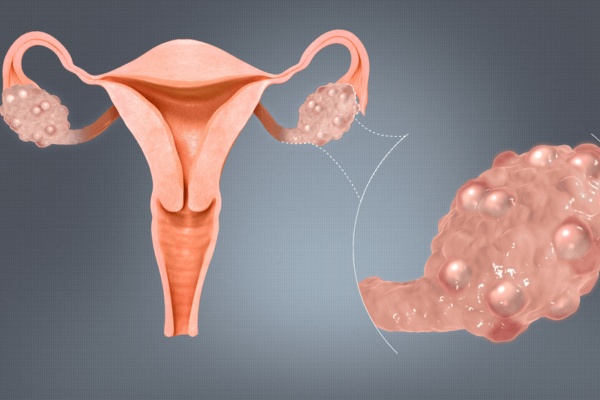Key Takeaways:
- Inositol and metformin are both used to manage symptoms of polycystic ovary syndrome (PCOS) and insulin resistance.
- Recent studies suggest that inositol may be as effective as metformin in improving metabolic and hormonal parameters in women with PCOS.
- Both treatments have unique benefits and potential side effects, and the choice between them should be tailored to the individual's needs and medical history.
Polycystic ovarian syndrome (PCOS) is a common endocrine disorder affecting women of reproductive age, characterized by insulin resistance, hormonal imbalances, and metabolic complications.
Metformin, a medication traditionally used to treat type 2 diabetes, has been widely prescribed to manage PCOS due to its ability to improve insulin sensitivity. However, in recent years, inositol, a naturally occurring substance belonging to the vitamin B complex group, has emerged as a potential alternative.
This article delves into the question: is inositol as good as metformin for individuals dealing with PCOS and insulin resistance?
Understanding PCOS and Insulin Resistance
PCOS is a condition marked by a combination of symptoms such as irregular menstrual cycles, excess androgen levels, and polycystic ovaries. Insulin resistance, a state where the body's cells do not respond effectively to insulin, is a key feature of PCOS and can lead to elevated insulin and plasma glucose levels.
Managing insulin resistance is crucial for improving PCOS symptoms and reducing the risk of developing type 2 diabetes and cardiovascular diseases.
Metformin: The Traditional Treatment for PCOS
Metformin works by enhancing insulin sensitivity, leading to a decrease in fasting blood glucose and insulin levels. It has been shown to improve metabolic parameters, restore ovulation, and reduce androgen levels in women with PCOS.
Despite its benefits, metformin treatment can be associated with adverse effects such as gastrointestinal discomfort, which may limit its use in some patients.
Inositol: A Promising Alternative
Inositol, specifically myo-inositol and d-chiro-inositol, plays a role in insulin and lipid metabolism. Studies have indicated that inositol can improve insulin sensitivity, menstrual cycle length, and ovarian function in PCOS women.
It is often considered to have fewer side effects compared to metformin, making it an attractive option for many.
Comparing Efficacy: Myo-Inositol Versus Metformin
Several randomized controlled trials have compared the efficacy of myo-inositol versus metformin in women with PCOS. These studies have assessed various outcomes, including body mass index (BMI), fasting insulin, and sex hormone binding globulin (SHBG) levels.
The results have shown significant improvements in metabolic and hormonal effects, suggesting that myo-inositol may be as effective as metformin for some individuals.
Impact on Fertility and Reproductive Outcomes
Fertility is a major concern for many women with PCOS. Both metformin and inositol have been studied for their effects on fertility parameters such as ovulation rate and pregnancy outcomes.
Randomized clinical trials have provided evidence that both substances can improve fertility in PCOS women, although the results may vary based on individual characteristics.
Dietary Considerations in PCOS Management
The Role of Diet in Enhancing the Effects of Inositol and Metformin
When discussing the management of polycystic ovary syndrome (PCOS), the interplay between diet and medication cannot be overstated. A balanced diet, rich in nutrients, can complement the effects of both myo-inositol and metformin.
For instance, studies suggest that a diet with a low glycemic index may improve insulin sensitivity, which is a primary concern for women with PCOS. This dietary approach, when combined with myo-inositol or metformin therapy, could potentially lead to a more significant decrease in insulin resistance, thus enhancing the overall treatment efficacy.

Moreover, the inclusion of foods high in folic acid, such as leafy greens and legumes, may further support the therapeutic benefits of myo-inositol. Folic acid has been shown to work synergistically with inositol, improving its bioavailability and function.
This combination is particularly noteworthy in randomized controlled clinical trials where the primary outcome focuses on improving the androgen and lipid profiles of patients treated for PCOS.
By adopting a diet that supports the action of these two insulin sensitizers, women with PCOS may experience improved glycemic control and better management of their symptoms.
Nutritional Supplements: Companions to Myo-Inositol and Metformin
In addition to dietary changes, the use of nutritional supplements can play a pivotal role in managing PCOS. For example, omega-3 fatty acids, which are known for their anti-inflammatory properties, may help in reducing the cardiovascular risks associated with PCOS.
When used alongside myo-inositol or metformin, omega-3 supplements could contribute to a more favorable modification of the lipid profile in overweight and obese women with this syndrome.
Furthermore, the integration of vitamin D supplements has been a subject of interest in several randomized controlled trials. Vitamin D deficiency is common in women with PCOS and has been linked to insulin resistance and impaired glucose metabolism.

By correcting this deficiency, vitamin D may enhance the effectiveness of myo-inositol and metformin in managing blood sugar levels and improving ovulatory function.
As such, a systematic review and meta-analysis of these interventions could provide valuable insights into the optimal combination of diet, supplements, and medication for treating PCOS.
The Interplay of Hormones in PCOS: Myo-Inositol's Role
Polycystic Ovary Syndrome (PCOS) is a hormonal disorder that often involves an imbalance of insulin and other hormones like follicle-stimulating hormone (FSH). Myo-inositol has been spotlighted in a randomized controlled clinical trial for its role in modulating hormone levels.
Studies suggest that myo-inositol can influence FSH, potentially improving ovarian function and menstrual regularity in women with PCOS. This is crucial because FSH is integral to the maturation of ovarian follicles, and its imbalance is a common issue in PCOS.

In contrast to the metformin group in various studies, those receiving myo-inositol have shown significant differences in their hormonal profiles. The improvements in hormone levels are not just numbers on a lab report; they translate to real-world benefits for women struggling with this syndrome.
A systematic review and meta-analysis of these trials could provide more concrete evidence, but the existing data is promising. Myo-inositol's ability to manage blood sugar and influence hormones makes it a compelling option for treating PCOS.
The Role of Chiro-Inositol in PCOS Management
Chiro-inositol, a close relative of myo-inositol, has been gaining attention in the management of polycystic ovary syndrome (PCOS). While myo-inositol is often discussed, chiro-inositol also plays a pivotal role in insulin signaling and ovarian function.
Studies have shown that the combined supplementation of myo-inositol and chiro-inositol, in the physiological plasma ratio, can be more effective than either isomer alone. This synergy may enhance the body's response to insulin, a key factor in the management of PCOS.
Furthermore, chiro-inositol's involvement in the regulation of blood sugar and lipid levels suggests that it could be a significant player in reducing the metabolic symptoms associated with PCOS.
Although not as widely studied as myo-inositol versus metformin, emerging research indicates that chiro-inositol could be a valuable component in a comprehensive approach to treat PCOS.
As with any treatment, the efficacy of chiro-inositol should be assessed through a randomised controlled trial or a placebo-controlled trial to establish a statistically significant difference in outcomes.
Hormonal Balance and PCOS: The Role of Follicle Stimulating Hormone
The intricate hormonal interplay in PCOS often involves an imbalance of the follicle stimulating hormone (FSH) and its counterpart, luteinizing hormone (LH). FSH is crucial for the growth and maturation of ovarian follicles, and an imbalance can lead to the suboptimal development of oocytes, contributing to infertility issues common in PCOS.
Addressing this hormonal imbalance is a key therapeutic target, and both myo-inositol and metformin have been shown to influence these hormone levels, albeit through different mechanisms.

Myo-inositol, in particular, has been noted to improve the body's FSH response, which may lead to better quality eggs and improved fertility outcomes. This effect has been observed in several studies, including a review and meta-analysis, which suggest a significant difference in the FSH levels of women with PCOS when treated with myo-inositol.
These findings are promising and support the international evidence-based guideline that recommends considering inositol as part of a comprehensive treatment plan for PCOS.
Integrating Inositol and Metformin with Lifestyle Changes
When it comes to treating PCOS, the combination of myo-inositol and metformin with lifestyle modifications can be a game-changer. International evidence-based guidelines for PCOS management often emphasize the importance of diet and exercise in conjunction with medication.
Myo-inositol, in particular, has been shown to work synergistically with lifestyle changes to help manage blood sugar levels and reduce insulin resistance, which are key issues in PCOS.
A randomized controlled trial or a placebo-controlled trial could shed light on the extent of the benefits of combining these treatments. However, anecdotal evidence and smaller studies have already hinted at the potential.
For instance, when myo-inositol is paired with a healthy diet and regular physical activity, patients often report better outcomes than when relying on oral contraceptives or metformin alone.
This holistic approach to managing PCOS could lead to a more sustainable and effective treatment plan, offering hope to many who suffer from this condition.
The Influence of Exercise on PCOS and Insulin Sensitizers
Exercise as a Complementary Treatment to Myo-Inositol and Metformin
Exercise is a cornerstone of PCOS management, with its benefits extending beyond weight loss. Regular physical activity has been shown to improve insulin sensitivity, which is crucial for women with polycystic ovary syndrome.
When combined with treatments like myo-inositol or metformin, exercise can lead to a more pronounced improvement in insulin resistance and glycemic control.
A randomized controlled trial might reveal that patients who engage in consistent exercise, in addition to taking myo-inositol or metformin, experience a more significant decrease in fasting insulin levels and an improvement in their oral glucose tolerance test results.

Moreover, exercise has been found to influence the androgen and lipid profiles positively, which are often disrupted in PCOS. By incorporating regular physical activity into their routine, women with PCOS may notice a reduction in free testosterone levels and an improvement in their overall lipid profile.
This, in turn, can enhance the effectiveness of myo-inositol versus metformin in managing the hormonal imbalances associated with the condition.
The impact of exercise on these outcomes could be a subject of interest in a randomized controlled crossover study, providing a clearer understanding of how to optimize PCOS treatment.
Tailoring Exercise Regimens to Individual Needs in PCOS
The type and intensity of exercise recommended for women with PCOS should be tailored to their individual needs and capabilities. A combination of aerobic and resistance training has been suggested by international evidence-based guidelines for the management of PCOS.
Aerobic exercises, such as walking, cycling, or swimming, can help manage body weight and improve cardiovascular health. On the other hand, resistance training, like weight lifting, can specifically target insulin resistance and muscle building.

It is essential to consider the inclusion and exclusion criteria for exercise regimens in randomized controlled trials when evaluating their effectiveness. For instance, the treatment groups in a study may differ in their baseline activity levels, which could influence the primary outcome measures.
By personalizing exercise programs and considering the unique challenges faced by women with PCos, healthcare providers can maximize the benefits of exercise as a complementary treatment to myo-inositol and metformin.
Side Effects and Tolerability
When considering any treatment, it is important to weigh the potential benefits against the possible adverse effects. Metformin is known for its gastrointestinal side effects, while inositol is generally well-tolerated.
However, individual responses can vary, and some may experience side effects with inositol as well.
Mental Health Considerations
PCOS is not only a physical condition but can also have significant mental health implications. Both metformin and inositol have been studied for their effects on mental health parameters in women with PCOS.
While some studies suggest improvements with treatment, more research is needed to fully understand the impact on mental health.
The Role of Combined Treatment
For some individuals, a combined treatment approach using both metformin and inositol may be beneficial. Randomized controlled crossover studies have explored the effects of combined treatment on insulin resistant PCOS patients, showing potential advantages over monotherapy in certain cases.
Personalized Medicine: Tailoring Treatment to the Individual
The decision to use inositol or metformin should be based on a comprehensive evaluation of the individual's medical history, preferences, and specific PCOS manifestations.
Personalized medicine is key to optimizing treatment outcomes and ensuring that the chosen therapy aligns with the patient's unique needs.
The Verdict: Is Inositol as Good as Metformin?
The question of whether inositol is as good as metformin cannot be answered definitively due to the variability in individual responses and the complexity of PCOS.
However, evidence from randomized controlled trials and systematic reviews suggests that inositol is a viable alternative or adjunct to metformin for many women with PCOS.
Future Directions in PCOS Treatment
As research continues to evolve, new insights into the management of PCOS and insulin resistance are emerging. Future studies focusing on long-term outcomes, different population subsets, and the exploration of gene expression related to insulin sensitivity will further clarify the roles of inositol and metformin in treating this condition.

Final Thoughts
In conclusion, both inositol and metformin have their place in the management of PCOS and insulin resistance. The choice between them should be made on a case-by-case basis, considering the individual's specific health profile and treatment goals.
Ongoing research and clinical trials will continue to shed light on the comparative effectiveness of these treatments, helping healthcare providers make informed decisions for their patients.
FAQ Section
Q1: Can inositol replace metformin for all women with PCOS?
A1: Inositol may be an effective alternative for some women with PCOS, but it may not be suitable for everyone. The decision should be based on individual health needs, medical history, and the advice of a healthcare professional.
Q2: Are there any long-term side effects associated with taking inositol for PCOS?
A2: Inositol is generally considered safe and well-tolerated, but long-term studies are needed to fully understand any potential side effects. As with any supplement or medication, it is important to discuss the risks and benefits with a healthcare provider.
Q3: How quickly can one expect to see improvements in PCOS symptoms with inositol or metformin?
A3: The time frame for seeing improvements can vary widely among individuals. Some may notice changes within a few weeks, while for others, it may take several months. Consistent treatment and follow-up with a healthcare provider are essential for monitoring progress.
Other Sources:
BioMed Central - "Inositol is an effective and safe treatment in Polycystic ovary.." https://rbej.biomedcentral.com/articles/10.1186/s12958-023-01055-z
PCOS Nutrition Center Blog - "Inositol of Metformin for PCOS: What The Evidence Show" https://www.pcosnutrition.com/metforminandinositol/








